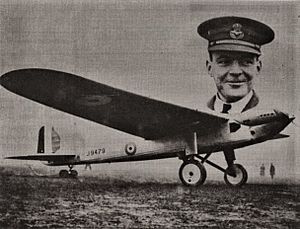Arthur G. Jones-Williams facts for kids
Quick facts for kids
Arthur Gordon Jones-Williams
|
|
|---|---|
 |
|
| Born | 6 October 1898 |
| Died | 17 December 1929 (aged 31) French Tunisia |
| Allegiance | United Kingdom |
| Service/ |
Royal Flying Corps Royal Air Force |
| Years of service | 1916 - 1929 |
| Rank | Captain |
| Unit | No. 29 Squadron RFC No. 65 Squadron RAF |
| Battles/wars | World War I |
| Awards | Order of the British Empire Military Cross with Bar French Croix de Guerre |
Captain Arthur Gordon Jones-Williams (born October 6, 1898 – died December 17, 1929) was a brave pilot from Wales. He was known as a "flying ace" during World War I. This means he shot down many enemy aircraft. Later, he tried to set new world records for flying long distances without stopping.
Contents
Early Life and Beginnings
Arthur Gordon Jones-Williams was born in Wales on October 16, 1898. When he was older, he joined the Welsh Regiment in the army. Soon after, he moved to aviation.
World War I Pilot
In 1917, Jones-Williams joined the Royal Flying Corps. This was the air force of Britain at the time. He trained to fly fighter planes.
He became a pilot with No. 29 Squadron. He flew a type of plane called a Nieuport fighter. He worked with other pilots like D'Arcy Fowlis Hilton.
In May 1917, he became a flight commander. This was a leadership role for a group of planes. He also earned his first important award, the Military Cross.
He earned a second award, called a Bar, in July. This was like getting the Military Cross again. Between April and September 1917, he shot down eight German Albatros fighter planes.
After some time in the hospital, he returned to France. He became a flight commander again. This time, he flew with No. 65 Squadron.
He flew a different plane, a Sopwith Camel. Between September and October 1918, he shot down three more German Fokker D.VII fighters. In total, he was credited with eleven victories. This made him a "flying ace."
After the War
After World War I ended, Arthur Gordon Jones-Williams stayed in the Royal Air Force. This was the new name for the British air force. He continued to fly different types of planes.
In 1928, he was promoted to Squadron Leader. This was an important rank in the Royal Air Force.
He became famous for trying to break flight records. Between April 24 and 26, 1929, he and his co-pilot, Norman Jenkins, made a huge flight. They flew from the United Kingdom all the way to British India.
They covered over 4,130 miles (6,651 kilometers). Their flight took 50 hours and 48 minutes. They flew in a special plane called a Fairey Long-Range Monoplane. They almost broke the world record for non-stop flight distance.
Later that year, Jones-Williams tried to break the record again. He planned to fly non-stop from England to Cape Town, South Africa. Sadly, his plane crashed on December 17, 1929. The crash happened in French Tunisia. He died during this brave attempt.
Awards and Honours
Arthur Gordon Jones-Williams received several important awards for his bravery and service:
- Military Cross (MC): This award was given for his great courage. He often attacked many enemy planes at once. Once, he attacked twelve enemy planes by himself. He managed to destroy one and force another to land.
- Military Cross (MC) Bar: He received this for showing continued bravery. He fought enemy planes even when they outnumbered him. He kept fighting until he ran out of ammunition.
- French Croix de Guerre with Palme: This was a French award for his service. It was given to him in 1919.
- Order of the British Empire: He received this award in June 1927. It is a very high honour in Britain.
- Gold Medal of the Royal Aero Club: This medal was given to him in 1929. It recognized his amazing long-distance flight.
Images for kids
 | Tommie Smith |
 | Simone Manuel |
 | Shani Davis |
 | Simone Biles |
 | Alice Coachman |

